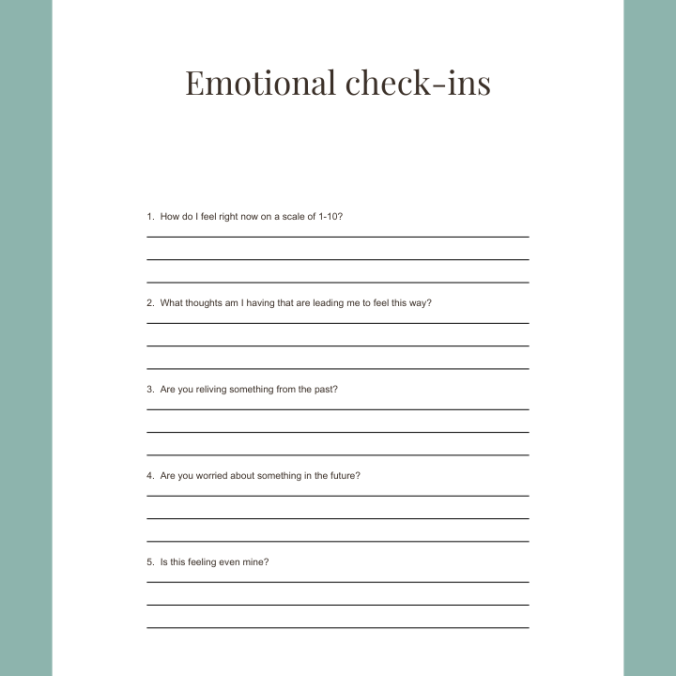Daily Emotional Check-Ins
In everyday life, it’s easy to overlook our emotions, brushing them aside in favor of productivity or immediate concerns. But our emotional well-being impacts everything—our relationships, decisions, and overall quality of life. Taking just a few moments each day for emotional check-ins can revolutionize how we understand and manage our feelings, leading to greater self-awareness and emotional balance.
One simple yet powerful way to start this practice is by setting alarms on your phone to remind yourself to pause and check in with your emotions. Here’s how it works and why it matters.
The 5-Question Emotional Check-In
When your alarm goes off, take a deep breath, and ask yourself these five questions:
- How are you feeling right now on a scale of 1-10?
This helps you quantify your emotional state, making it easier to track patterns over time. - What thoughts are leading you to feel this way?
Identifying your current thought patterns brings clarity to the connection between your mind and emotions. - Are you reliving something from the past?
This question encourages you to discern whether past experiences are influencing your present emotional state. - Are you worried about something in the future?
Worry often pulls us out of the present moment. You may find that your worry about the future is frequently affecting your emotions in the now. - Is this feeling even mine?
Sometimes, we absorb the emotions of others without realizing it. This question helps you differentiate between your own feelings and external influences.
Why Multiple Check-Ins Matter
Making emotional check-ins a regular habit allows you to become more attuned to your emotional landscape. Here’s how this practice can benefit you over time:
- Recognizing Patterns
Regularly observing your emotions helps you notice trends. Are you consistently feeling stressed after certain meetings? Does your mood dip in the afternoon? Identifying these patterns gives you a clearer picture of how your day-to-day thoughts and experiences influence your emotions. - Monitoring Your Emotional Levels
Over time, you’ll become more aware of your emotional fluctuations, even without an alarm. For example, you might begin to notice your emotional baseline as it starts to dip so that you can become consciously curious about what is going on. - Gaining Personal Insight
By repeatedly examining your feelings and their triggers, you develop a deeper understanding of yourself. You might uncover unhelpful thought patterns, emotional responses tied to specific situations, or areas where you’ve been carrying someone else’s emotional weight. - Improving Mood and Resilience
As this practice becomes second nature, you’ll find yourself more equipped to respond to emotional dips with care and intention. Over time, this can lead to an improved baseline mood, greater resilience, and a stronger ability to navigate challenges.
Making Emotional Check-Ins a Habit
Habits take time to form, but consistency is key. Start with 3 to 5 alarms scheduled daily to create the pattern of doing check-ins. Over time, you might find it helpful to change the freuency of reminders or adjust the timing based on your routine.
As you continue this practice, it will likely become second nature. You may find yourself intuitively checking in during emotional highs or lows without needing the external reminder. This is a sign that you’re building emotional awareness—a skill that can improve not only your mood but also your relationships and overall well-being.
A Tool for Self-Compassion
Finally, remember that this practice is about self-compassion. Checking in with yourself throughout the day is an act of kindness and care, a way of saying, “I see you, and I’m here for you.”
As you build this habit, you’ll find it becomes a source of stability and insight. You’ll learn to meet your emotions with curiosity rather than resistance, note beliefs or patterns that are no longer in alignment, integrate strategies to improve thoughts and moods, foster a deeper connection with yourself—and ultimately, a live a more balanced, fulfilling life.
Why not try it today? Set your first alarm, ask yourself these five questions, and start the journey toward greater emotional awareness and well-being.


